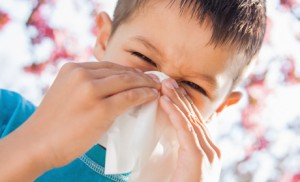Here comes that time of year again — ready, set, blow! Parents and kids fall prey to all sorts of common allergens, but no more so than in spring when it’s all about tree pollen, says David Bernstein, M.D., of Bernstein Allergy Group, Inc. High pollen counts begin in early March and peak the first couple weeks in April, he says, after which grass pollen takes over in mid-May and continues through June. Lovely.
If your child experiences symptoms like itchy or red eyes, runny nose, and congestion during these time periods, it’s a safe bet he’s got seasonal allergies, which means it’s pretty easy to figure out what he’s allergic to. But it’s still a good idea to see an allergist for a full-on evaluation, especially if your little one is buried in a mound of tissues.
After a thorough history is taken, including a check for asthma (Bernstein says about a third of kids with nasal allergies develop asthma), there comes a skin prick test — a drop of allergen is placed on the skin then pricked or scratched to look for a reaction.
What To Do at Home
On the home front, Bernstein says parents can look into options like investing in a HEPA filter, keeping the humidity at 40 – 50 percent, and use fine-woven casings for pillows and mattresses. These are preventative steps which can often help some kids a lot. Others who don’t see relief may need to see that allergist.
On the Horizon
Last spring, the FDA approved a tablet for grass pollen allergies, according to Bernstein. Oralair is approved for ages 10 – 65 and is placed under the tongue. The first tablet is taken in the office under a doctor’s supervision, but after that, they can be taken daily at home. They take several months to have an effect which is just like immunotherapy — allergy shots.
When a kid has severe allergies, busy parents have to try and work in allergist visits every couple of weeks, so Oralair is good news for them and great news for kids who don’t like to get shots. Although it only treats one kind of allergy (and plenty of kids suffer from multiple allergens), it’s always great when something new — and easy to take — comes along.
Severe Allergies
Immunotherapy — aka, allergy shots — is for kids who can’t get any kind of allergy relief any other way. The idea behind allergy shots is to reduce a kid’s sensitivity to an allergen by exposing him to it in incrementally increasing doses. Allergy shots are given every two to four weeks, for anywhere from three to five years. Bernstein says that children often respond very well to the treatment and can eventually stop receiving the shots. He adds that shots can even reduce a child’s risk of developing asthma.
“Will it Hurt?”
Anticipating a shot can strike fear in the hearts of many children. How to help them cope?
- Use distraction suitable to your child’s age to ease the pain perception of the shot. Distraction can reduce the distress.
- For older kids, having them repeat a positive statement like, “I can do this” or “I am brave” can help.
- Always be honest, but don’t dwell on the idea of pain. Tell your child it’ll be quick, but that he’ll get through it.





